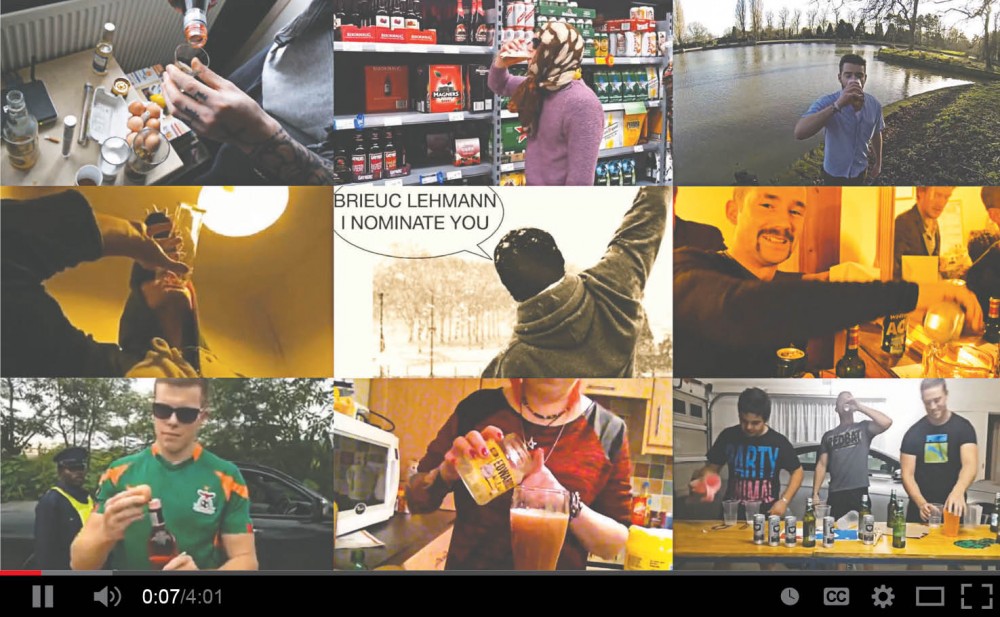Marshall Dalziel stripped down to his boxers, took a pull of Captain Morgan, pretended to swim through a snow bank and crossed a finish line, where his friend tossed him a beer.
The University of Minnesota history junior turned to the camera filming him and challenged three of his most competitive friends to top his feat, and he posted the video on Facebook.
Dalziel was playing the drinking game “NekNominate,” which has gained popularity on social media in recent months, particularly among young men.
The game’s only rules are that after someone is nominated, they must choose a drink or a drinking stunt to outdo the person who nominated them, film themselves doing it within 24 hours and nominate a few others to do the same. The game reportedly began after an Australian rugby player filmed himself chugging, or “necking,” a beer and challenged a friend to do it, too.
International news sources have reported five deaths related to the game. University experts warn against the societal and health implications of high-risk drinking.
Dalziel said he got a few concerned responses to the video on Facebook but mostly received likes and laughs.
“When my buddy did his, his was really good, so that kind of set the bar high for me,” he said. “I kind of wanted to do something funny or creative.”
Dave Golden, Boynton Health Service director of public health and communications, said he worries not only about alcohol poisoning or death as a result of high-risk drinking, but also about other possible consequences, like sexual assault, fights or drunk driving.
“Any challenge to increase your blood alcohol content as fast as you can is really a dangerous idea,” he said.
Health experts also warn about mixing alcohol with extreme cold — a situation in which they see some of the most severe frostbite cases.
According to the most recent Boynton survey, about 30 percent of students on the University’s Twin Cities campus reported that they had taken part in high-risk drinking in the past two weeks. While this is a high percentage, Golden said, the number is average when compared to different regions nationally.
Assistant journalism professor Shayla Thiel-Stern, who studies the effects of digital media on culture and society, said she believes the basic principles that make up social media probably contributed to the popularity of nomination games like “NekNominate.”
“It plays into this characteristic of social media users to want to do something that they think is novel and fun that you can actually visibly see,” she said.
And because the game is circulated from friends within a network to other friends, she said, people are more likely to find it appealing or relevant.
The “NekNominate” Facebook page has more than 16,500 likes. Dalziel said he thinks young men in particular like the game because of their competitiveness.
Architecture senior Juan Acosta, who also played the game, agrees.
“I liked the challenge a little bit, I guess,” he said, “and I didn’t want my friends to rag on me at all.”
When he nominated three friends of his, Acosta said he chose those he thought would be most likely to keep it going.
Acosta worried about some friends, parents or employers seeing the video, he said, so he changed the privacy settings to prevent those over a certain age from viewing it.
“It’s becoming increasingly common for people to maintain a social media in which certain people are able to see certain aspects of their identity and others are not,” Thiel-Stern said. “People used to use a disposable camera to take pictures of these sorts of things, and they would only show some close people. This is just a more high-tech way of doing that.”
Both Acosta and Dalziel said they have seen less of the game online these days and think the fad might be dying out.
Golden said although it might have been fun for some, he’s glad it seems to be losing popularity.
Students need to look out for each other when drinking, he said.
They should call 911 immediately if they experience negative consequences from drinking or if a friend is not responsive after drinking, he said. Because of the medical amnesty law that passed last year, an underage student will not be charged for drinking if they call to help an impaired friend.
“Generally, students here make really good decisions,” he said. “They take advantage of Gopher Chauffeur, and they look out for each other. I do have a lot of confidence in our population.”


